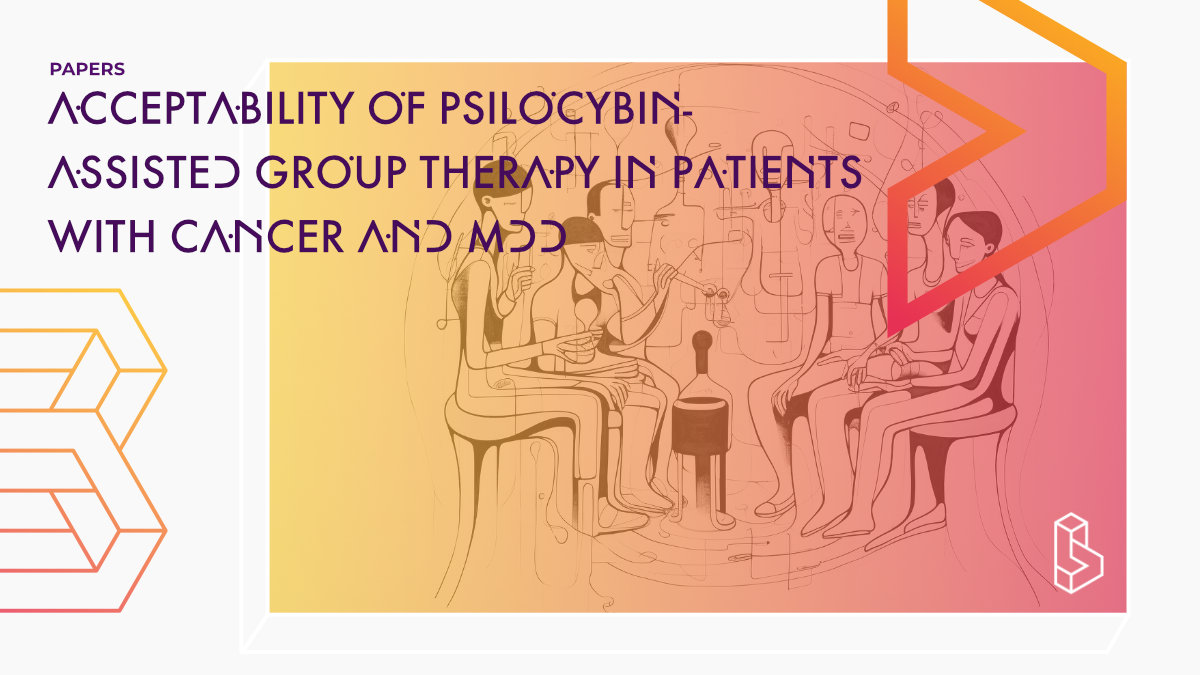This interview study (n=28) explored the acceptability of psilocybin-assisted group therapy in patients with cancer and depression (MDD) who were part of a clinical trial. Through semi-structured interviews, it found a generally positive view towards group therapy, highlighting its role in enhancing participants’ safety, preparedness, connection, and belonging. The study identified key factors influencing acceptability, including the therapeutic framework’s importance, the complementary nature of individual sessions, and the impact of group size and interaction structure.
Abstract of Acceptability of psilocybin-assisted group therapy in patients with cancer and major depressive disorder
“Background The present study explored the acceptability of psilocybin-assisted group therapy from the perspective of patients with cancer and depression who participated in a clinical trial assessing the safety and efficacy of this novel intervention.
Methods Guided by the conceptual framework of acceptability, the authors conducted semi-structured interviews with participants of the psilocybin trial. Data were analyzed using template and thematic analyses.
Results Participants’ (n=28) perspectives on the acceptability of the group and simultaneous sessions was generally positive, both in terms of safety and efficacy: first, the groups contributed to increase participants’ sense of safety and preparedness as they were engaging in the therapy; and second, the groups fostered a sense of connection and of belonging, which served to enrich and deepen the meaning of participants’ experience, ultimately opening a dimension of self-transcendence and compassion. Other subthemes related to factors influencing the acceptability of the group approach included: 1) the importance of the therapeutic framework, 2) the complementary value of individual sessions, 3) disruptive factors related to the group and/or simultaneous setting, and 4) opportunities and challenges related to group size and how to structure interactions.
Conclusions This study enhances understanding of what promotes acceptability of the psilocybin-assisted therapy group model for the treatment of MDD in cancer patients.”
Authors: Yvan Beaussant, Elise Tarbi, Kabir Nigam, Skye Miner, Zachary Sager, Justin J. Sanders, Michael Ljuslin, Benjamin Guérin, Paul Thambi, James A. Tulsky, Manish Agrawal
Summary of Acceptability of psilocybin-assisted group therapy in patients with cancer and major depressive disorder
Among the 15 million Americans living with cancer, up to one in five meet the criteria for major depressive disorder (MDD), which negatively impacts adherence to treatment, quality of life, mortality, and health care costs. Psilocybin-assisted therapy (PAT) may be an effective treatment for MDD but requires substantial resources.
Group approaches have been developed to overcome the limitations of individual PAT. In one trial, 18 long-term HIV survivors with demoralization syndrome received group therapy during psilocybin preparation and integration sessions, and another trial in healthy volunteers conducted simultaneous administration of psilocybin with up to six participants per session without serious adverse events.
The objective of the present study was to explore the acceptability of psilocybin-assisted group therapy from the perspective of the trial’s participants.
Find this paper
https://doi.org/10.1002/cncr.35024
Paywall | Google Scholar | Backup | 🕊
Cite this paper (APA)
Beaussant, Y., Tarbi, E., Nigam, K., Miner, S., Sager, Z., Sanders, J. J., ... & Agrawal, M. (2023). Acceptability of psilocybin-assisted group therapy in patients with cancer and major depressive disorder: Qualitative analysis. Cancer.
Study details
Compounds studied
Psilocybin
Topics studied
Depression
Palliative Care
Study characteristics
Original Re-analysis
Open-Label
Participants
28
Humans
Institutes
Institutes associated with this publication
Sunstone TherapiesSunstone Therapies is dedicated to the development and implementation of innovative therapies for individuals affected by cancer and other conditions.
Linked Research Papers
Notable research papers that build on or are influenced by this paper
Psilocybin-assisted group therapy in patients with cancer diagnosed with a major depressive disorderThis Phase II, open-label trial (n=30) assessed psilocybin-assisted therapy (25mg) for patients with cancer and depression (MDD) with individual and group therapeutic support. The study reported no serious adverse events and suggested efficacy with a significant reduction in depression severity by week 8. Notably, 80% of participants had a sustained response, and 50% achieved full remission of depressive symptoms at week 1, maintained for eight weeks. The study highlights the safety and feasibility of psilocybin-assisted therapy in a group cohort.
Linked Clinical Trial
The Safety and Efficacy of Psilocybin in Cancer Patients With Major Depressive DisorderThis is a Phase II, single-center, fixed dose, open label trial to explore the safety, tolerability and efficacy of a 25mg dose of psilocybin in cancer patients with MDD.

